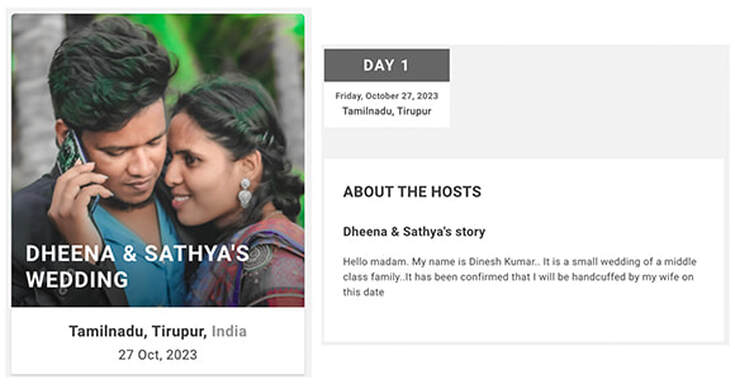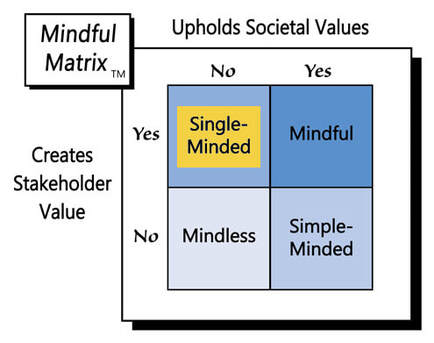author of Honorable Influence - founder of Mindful Marketing
A recent New York Times article described a growing trend among about-to-be-betrothed couples in India – inviting tourists to their weddings, for a fee. Having strangers pay for the privilege of attending the culturally rich ceremonies and often lavish receptions could be a way of lessening the costs of what can be very expensive events. For example, Yamini and Aditya Sharma’s January 2023 wedding in Jaipur, India cost $30 million rupees, or about $360,000. Surprisingly, though, financing doesn’t appear to be a main motive for selling wedding seats.
In 2016, Orsi Parkanyi, a Hungarian-Australian who lives in Norway, founded Join My Wedding – a web-based company that connects Indian couples willing to open their weddings to outsiders with those who want to attend them. The site provides a virtually endless stream of available matrimonial events, most of which include:
- a picture of the couple
- a little about their story
- the location and date(s) of the wedding (some are multiday affairs)
- a daily itinerary
- dietary options
- a dress code
- the cost per person
Speaking from firsthand experience, India’s culture is truly special – from vibrantly colored clothing to deliciously spicy food to some of the world’s kindest and most caring people. I’ve never attended an Indian wedding, but I can imagine doing so would be a rich, culturally immersive experience unlike any other.
Such a unique opportunity explains why there’s interest or demand for attending Indian weddings. Hopefully, paying guests go to the weddings with a mindset of respect for the culture and an eagerness to appreciate and learn from it. Some attendees, however, may just want to see a spectacle that they can boast about in social media: “Look at the crazy thing I did (that you never will).”
But what explains the abundant supply of ceremonies for sale?
Again, the main motivation doesn’t appear to be financial. A quick survey of options on Join My Wedding shows that most couples price their tickets from $150 - $250. Subtract the cost of food and other per person expenses and the net profit from each paid guest’s is probably just $50 or so, which is nothing compared to a wedding that costs hundreds of thousands of dollars.
So, given there’s no real monetary incentive, why are so many Indian couples willing to open for public consumption one of the most intimate moments of their lives?
Some of the couples have suggested they wanted to share their culture, while others have said they desired to add “a distinctive component to their wedding.” The second reason seems vague but makes more sense after hearing Mr. Sharma, whose $300K wedding was mentioned above, say he believed it would be unique to have a foreigner attend his wedding.
Of course, there are many other ways to make a wedding unique, so why do so by inviting complete strangers to share your special day?
Author of “Matchmaking in Middle Class India” and sociologist at the University of Cambridge, Dr. Parul Bhandari has explained that hosting foreign guests at their wedding can serve to raise the status of the couple:
“A non-Indian, particularly white person, attending one’s wedding is seen as a status symbol,” she added. “It communicates that the couple or their family have social networks beyond their country and by that token, demonstrates a sort of cosmopolitanism and ‘success.’”
Bhandari’s analysis is not surprising: While in India, I learned that, historically, lighter color skin was considered more desirable, as it signaled higher social class. The desire to flaunt different-looking foreigners also makes sense in an age of social-media-driven one-upmanship.
More people than ever are pursuing social validation measured digitally by likes and shares. Moreover, they’re yearning to stand out, to be seen as special, and to grab their “15 minutes of fame.” The idea of selling tickets to their special event and having ‘dignitaries’ attend likely fulfills those same needs and may even allow couples to feel a little like celebrities.
The idea that there are satisfied buyers and sellers on both sides of the growing number of wedding exchanges suggests that selling entry to Indian marriage ceremonies is good marketing, but is it ethical?
Aside from the occasional social gaffe, like tourists dressing inappropriately, the cultural understanding that likely occurs at the events is a benefit of the wedding sharing. Immersing oneself in a culture that’s different than one’s own is almost always a good thing.
However, there may be a consideration greater than the satisfaction of the individuals involved and perhaps even more important than the potential cultural understanding:
What about the impact on the institution of marriage?
Couples and their families are foundational components of most societies. New marriages are often the starting point, and sustained unions provide helpful continuity and stability for the couples themselves and for many people linked to them. There are also the greater social impacts of population maintenance and growth.
Degrading or trivializing marriage such that people enter into it lightly or for the wrong reasons can come at significant social costs, particularly if many marriages fail. Historically, India has had the lowest divorce rate in the world – only around 1%. However, some say that rate is now rising, as much as 50% - 60% particularly in urban areas. Whether divorce becomes more common in India and how it impacts the nation remains to be seen.
Ethics, however, aren’t just about consequences. Whether or not selling seats at weddings results in good or bad outcomes, there’s also the principle of respecting the wedding ceremony because of what it represents.
In many cultures, a wedding ceremony is considered a sacred event on par with just a few others, e.g., births and funerals. Commercialization can be a very good thing, but would it be right to sell tickets for seats in delivery rooms or memorial services? Are there certain events in life that simply shouldn’t be monetized?
Writing this piece in Central Pennsylvania, my thoughts went to the Amish, who are known for both their business savvy, e.g., producing and selling quilts and sheds, and their strongly held religious beliefs. So, I reached out to Dr. David Weaver-Zercher, assistant provost and professor of American religious history at Messiah University, who has authored several books about Amish life.
Weaver-Zercher shared that some Amish allow small outside groups to visit their homes for meals, e.g., for educational field trips, for which they accept nominal payment, e.g., $20 per person to cover their cooking costs. However, he firmly dismissed the notion that Amish would open their wedding ceremonies to outsiders who might want to pay to see them:
“Weddings are seen as worship services, and in many ways feel like a regular Sunday worship service, with only one small part of the service devoted to the actually wedding vows, etc. Just as Amish people wouldn’t open their Sunday morning services for spectators to pay a fee, neither would they open up a wedding for that purpose.”
Most of those involved in marketing weddings in India likely respect the ceremonies and the institution of marriage, but some seem as if they may not. For instance, below is a listing for one wedding in which the groom-to-be is pictured talking on his cellphone while his dutiful wife smiles awkwardly as she hugs him. Also, in describing the couple’s story, the groom says, “It has been confirmed that I will be handcuffed by my wife on this date.”
These particular components of the listing may have been meant in jest, but unfortunately, they likely signal what’s to come as more couples get creative and resort to unconventional tactics in trying to attract tourists to their ceremony over the many competitors. Weddings are joyous celebratory occasions that certainly can include fun, but they ultimately mark serious life- and society-impacting commitments.
India’s low divorce rate and its deeply rooted religious heritages suggest cultural predispositions to uphold the institution of marriage and to respect wedding ceremonies. So, any kind of degradation creep in India doesn’t bode well for countries next in line for wedding ceremony sales, where participants may play faster and looser with the notion of marital sacredness.
It's great that some people are experiencing an immersive view of India’s rich and diverse culture. Selling seats at weddings does produce some benefits; however, they’re outweighed by the moral costs of commercializing one of life’s most meaningful and important events. Accepting cash so outsiders can crash weddings is a commitment to “Single-Minded Marketing.”
Learn more about the Mindful Matrix.
Check out Mindful Marketing Ads and Vote your Mind!





 RSS Feed
RSS Feed